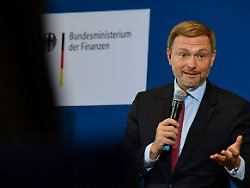Friday 10th December 2021
Controversial debt trick
Lindner wants a supplementary budget of 60 billion euros
Because of the pandemic, Germany was able to target record new borrowing in 2021. An exception to the debt brake made it possible. However, the new federal government now wants to use unused credit authorizations in the billions for climate protection.
After taking office, Federal Finance Minister Christian Lindner wants to initiate a supplementary budget as a first step. As the “Spiegel” reports, the FDP politician is planning a volume of around 60 billion euros. On Monday, Lindner wants to submit the budget to the new federal cabinet, and in the coming week it should be decided by the Bundestag in its last week of session of this year.
The traffic light coalition wants to use the money to top up the transformation and climate fund. For the supplementary budget, Lindner is using credit authorizations that were actually intended to combat the corona pandemic and its consequences for 2021, but are no longer needed. The federal government is taking on a total of 240 billion euros in debt this year, but only 180 billion are consumed – the 60 billion are therefore borrowing in reserve.
The funds are to be used to finance climate-friendly projects in the coming years. In fact, the federal government was only allowed to take out so many new loans this year because it made an exception to the debt brake anchored in the Basic Law in view of the pandemic. The reallocation of parts of these funds for the fight against climate change is therefore considered constitutionally controversial.
Criticism from the Federal Audit Office
In the coalition agreement, the traffic light coalitionists had already envisaged that unused reserves from this year would be transferred to a climate and transformation fund in a supplementary budget, from which the funds could be drawn in the coming years – without the funds then appearing in the federal budget.
The President of the Federal Audit Office, Kay Scheller, had clearly criticized these plans in the “Handelsblatt”. He called it “constitutionally problematic” to, as it were, park billions in reserves in the EKF for future investments in order to have them available in later budget years.
“Normally you would have simply reduced the loan requirement this year if you don’t need the money,” said Scheller. “Now the debts should be taken on anyway, in order to have room for maneuver for the future.” In the 2021 budget, a record debt of 240 billion euros is planned due to the corona pandemic, which will only be partially needed. If these funds were now used for climate investments, there would be no “reference to the emergency with which the suspension of the debt brake was justified,” warned the President of the Court of Auditors.
The debt brake allows the Federal Minister of Finance to borrow only 0.35 percent of economic output in normal times, currently around twelve billion euros in absolute numbers. From 2023, Lindner will have to meet the requirements again according to the resolution of the traffic light coalition. This is now easier for him because, because of the lavish new borrowing this year, he can put money aside for later if he has only very limited borrowing available.
